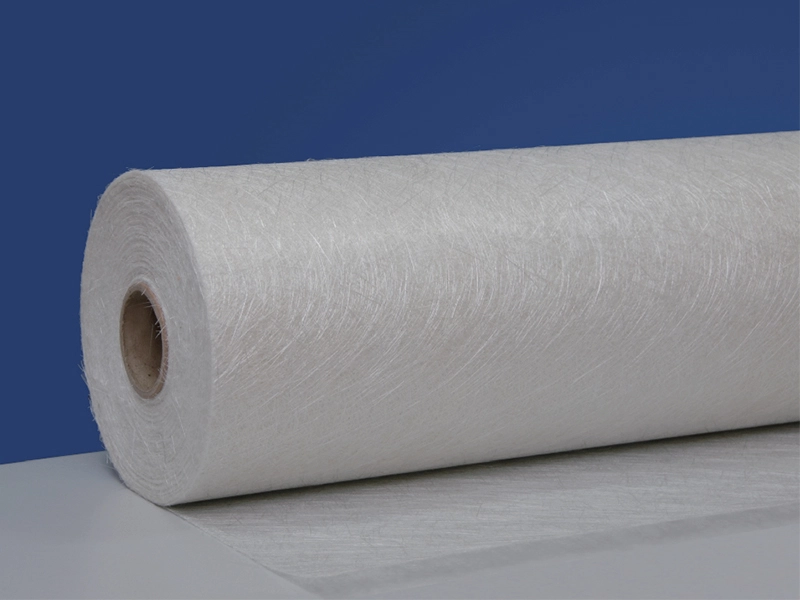Glass Fiber Surface Mat is a non-woven mat made of uniformly distributed continuous glass filaments, typically laid in a random orientation and bonded with a light emulsion binder. It is specially designed for use as a surface layer in fiber-reinforced plastic (FRP) laminates.
This mat provides a smooth, resin-rich surface to composite parts, enhances surface finish, improves corrosion and chemical resistance, and serves as an ideal substrate for gel coat bonding o anti-corrosive linings.
Introducción al rendimiento del producto
Though traditionally made in lighter weights (30–100 gsm), surface mats can also be used in combination with heavier reinforcement materials in multi-layer composite structures. Even in heavy-duty applications, the surface mat plays a crucial role in preventing fiber print-through, improving interlaminar bonding, and offering a chemically resistant barrier.
🧵 Material Structure:
-
Fiber Type: E-glass (alkali-free, electrical-grade)
-
Fiber Diameter: Typically 6–13 microns
-
Fiber Orientation: Random
-
Binder: Polyester, acrylic, or modified epoxy resin binder (emulsion-type or powder-type)
-
Form: Roll (with core inner diameter 76 mm or 152 mm)
🧪 Technical Data Sheet (TDS) – Typical Parameters:
| Propiedad | Typical Value / Range |
|---|---|
| Basis Weight (g/m²) | 30 – 100 gsm (standard); higher GSM on request |
| Espesor | 0.2 – 0.5 mm (depending on gsm) |
| Tensile Strength (MD/CD) | ≥ 40 N/50 mm (Machine Direction) |
| Binder Content | 5 – 15% |
| Moisture Content | ≤ 0.2% |
| Loss on Ignition (LOI) | 8 – 12% |
| Volatile Content | ≤ 3% |
| Compatibilidad de resina | Excellent with Polyester, Vinyl Ester, Epoxy |
| Roll Width | 1000 mm, 1250 mm, 2200 mm (customizable) |
| Peso del rollo | 15–40 kg (depends on GSM & width) |
| Storage Conditions | Dry and cool place (<35% RH recommended) |
💡 Características clave:
-
✅ Smooth surface finish: Provides a resin-rich surface layer that minimizes fiber print-through, ideal for exposed FRP surfaces.
-
✅ Improved corrosion resistance: Acts as a barrier layer against water, chemical agents, and environmental factors.
-
✅ Enhanced bonding: Helps improve the bond between the gel coat and the structural mat, enhancing composite integrity.
-
✅ Superior surface quality: Used in applications where aesthetics matter — such as automotive panels, doors, tanks, and bathroom fixtures.
-
✅ Lightweight & conformable: Easily conforms to complex molds and curves, ensuring full resin impregnation.
⚙️ Manufacturing Applications:
-
Hand Lay-Up & Spray-Up Molding
-
Filament Winding (Liner Layer)
-
Moldeo por transferencia de resina (RTM)
-
Pultrusion (as a surface wrap)
-
Vacuum Infusion Process (VIP)
🏭 Common End Uses:
-
Bathtubs, shower stalls, and bathroom fixtures
-
FRP tanks and pipes (as corrosion liner)
-
Electrical enclosures
-
Car body panels and automotive parts
-
Architectural panels and cladding
-
Marine parts and surfboards
🧾 Quality Standards:
Surface mats are typically manufactured according to the following industry standards:
-
ASTM D578 – Standard Specification for Glass Fiber Strands
-
ISO 2078 – Textile Glass – Yarns – Designation
-
ISO 2797 / 2798 – Mat and Roving Tests
-
RoHS / REACH compliant
📦 Packaging & Handling:
-
Rolls wrapped in PE film, packed in cartons or pallets
-
Must be stored in a dry, shaded environment
-
Avoid direct contact with moisture or sunlight
-
Shelf life: 12 months (if stored properly)
🔄 Customization Options:
Manufacturers may offer customization in:
-
GSM (gram per square meter)
-
Binder type (e.g., epoxy-compatible)
-
Roll width and core diameter
-
Flame retardant or chemically enhanced versions
Glass Fiber Surface Mat
solicitud
Química y Química / Infraestructura / Marina / Petroquímica / Edificación y Construcción
Preguntas más frecuentes
P:
¿Eres una fábrica? ¿Dónde te encuentras?
A :
Somos fabricantes de rejillas de FRP y perfiles pultruidos y comercializadores de materiales de hilo de FRP. Somos el mayor distribuidor de China Jushi Co. También vendemos productos de varios fabricantes de hilos FRP. Estamos en Anhui, China.
P:
¿Qué información se recomienda para la consulta?
A :
1. ¿Qué texto necesitas? 2. ¿Para qué aplicación lo usas? ¿O la tecnología es tejido, pultrusión o bobinado? 3. ¿Cuántas cantidades necesitas? 4. ¿Para qué resina combinas? ¿Resina de poliéster o resina epoxi? 5. ¿Necesita precio FOB o CIF? Si es CIF, díganos su puerto.
P:
¿Cuál es el MOQ?
A :
Generalmente 1 tonelada
P:
Paquete y envío
A :
Paquete normal: caja de cartón (incluido en el precio unitario) Paquete especial: debe cobrarse según la situación real. Envío normal: su envío de carga designado.
P:
¿Cuándo puedo ofrecer?
A :
Por lo general, cotizamos dentro de las 24 horas posteriores a la recepción de su consulta. Si es muy urgente obtener el precio, por favor llámenos o díganos en su correo electrónico, para que podamos responderle con prioridad.
P:
¿Cómo se cobran las tarifas de muestra?
A :
Si necesita muestras de nuestro stock, se las podemos proporcionar de forma gratuita, pero deberá pagar el flete. Si necesita un tamaño especial, le cobraremos la tarifa de fabricación de la muestra, que es reembolsable cuando realiza un pedido.
P:
¿Cuál es su tiempo de entrega para la producción?
A :
Si tenemos stock, podemos realizar la entrega en 7 días; Si no hay existencias, ¡necesita de 7 a 15 días!
Otros productos relacionados


